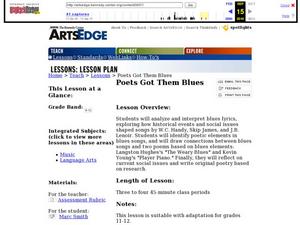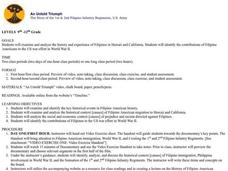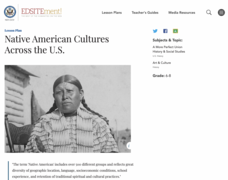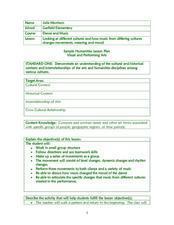American Association for the Advancement of Science
Sensing the Invisible: The Herschel Experiment
Learners of light will construct a contraption in which light is passed through a prism and shone into a box. The temperatures at different points along the path and outside of the path of light. The intent is to imitate William...
Curated OER
Give Me Liberty or Give Me Freedom
Welcome to America, the land of liberty and freedom. Examine the ways in which the terms liberty and freedom have been used in the United States. After researching and analyzing quotations from the past and present, young scholars create...
Curated OER
Heroes in Art
Students examine the life, portraits and speeches of Frederick Douglass. They consider what made his speeches effective and why he is regarded as a national hero. They write an original speech.
Curated OER
Ambassadors of Art
Have your class create their own art exhibit. Learners study the exchange of artwork between the Louvre in Paris and two American art museums, and create an introductory exhibit featuring European and American art from the Renaissance...
Curated OER
Poets Got Them Blues
Contemplate what music learners listen to and why they listen. Can they find poetry within music lyrics? Specifically hone in on blues lyrics and ruminate upon the social issues prevalent in the themes. Particular song lyrics coincide...
Curated OER
African Americans in World War II: Staging a Double V Campaign in the Classroom
The feelings and attitudes of African-Americans during World War II are examined by high schoolers. After watching various clips from "The War," they answer comprehension questions for each section. In groups, they create their own...
Curated OER
Civil Disobedience from Antigone to Hunger Games
Study the concepts and practice of civil disobedience through fiction and nonfiction texts.
MENSA Education & Research Foundation
Utopia/Dystopia: The American Dream
America was founded by dreamers, and the American dream still resonates in our country today. Track the American dream from its Puritan beginnings to its optimistic descendants with a instructional activity that focuses on speeches by...
Rockefeller Archive Center
Understanding Mass Media News
In an age of fake news and photoshopped images, it is vital that 21st century learners development the skills they need to evaluate mass media and assess its validity. A great way to launch such a study is with a carefully crafted lesson...
Curated OER
An Untold Triumph
High schoolers examine and analyze the history and experience of Filipinos in Hawaii and California. They identify the contributions of Filipino Americans to the US war effort in World War II, and analyze the many causes that led to...
Curated OER
Mexican Culture “La Raspa”
Here are three lessons that work together to engage learners in a cultural and musical exploration. In lesson one the listen to the Mexican folk song, "La Raspa" and discuss cultural context. In lesson two they dance along to both "La...
National Endowment for the Humanities
Upton Sinclair, Theodore Roosevelt, and Harvey W. Wiley
Though Upton Sinclair's novel The Jungle shocked the American public into a thorough examination of the meat-packing industry, the author was disappointed that his book's main argument—the exploitation of American immigrants—was not part...
National History Day
Why Did the United States Enter World War I in 1917?
World War I was the first major conflict on a global scale. Using primary documents, learners determine why the United States chose to enter World War I when it did. After analytical writing and group research, the causes of America's...
National Endowment for the Humanities
The 1828 Campaign of Andrew Jackson: Expansion of the Voting Base
Students give examples to indicate how the franchise was extended and limited in the first half of the 19th century, and cite some differences in the newly enfranchised population that could affect the way they would vote.
National Endowment for the Humanities
Women's Equality: Changing Attitudes And Beliefs
Students analyze archival materials contemporaneous with the birth of the Women's Rights Movement, and begin to appreciate the deeply entrenched opposition the early crusaders had to overcome. They discuss whether or not such attitudes...
EngageNY
The Motion of the Moon, Sun, and Stars—Motivating Mathematics
What does math have to do with the behavior of the earth and sun? Learn how the movement of celestial bodies has influenced the development of trigonometry. Scholars connects the details in mathematics to their real-world meaning.
Curated OER
Jazz in America Lesson Plan 7
Students survey free jazz and fusion. They explore how free jazz and fusion reflected American culture and society in the 1960s and 1970s.
Curated OER
Jazz in America Lesson Plan 6
Students survey bebop, cool jazz, and hard bop. They explore how bebop, cool jazz, and hard bop reflected American culture and society in the 1940s and 1950s.
Curated OER
Bambara's The Lesson
Twelfth graders read the short story The Lesson. They research the socio-economic and cultural context of the story and author. They examine the author's point of view. They analyze the first person narration in the story. They rewrite...
Curated OER
"Shooting An Elephant": George Orwell's Essay on His Life in Burma
High school readers examine George Orwell's essay "Shooting an Elephant" for examples of symbolism, metaphor, connotation, and irony. They analyze how these literary tools convey the writer's main point and contribute to the persuasive...
National Endowment for the Humanities
Native American Cultures Across the U.S.
Learners examine how American Indians are represented in today's society. They read stories, analyze maps, and complete a chart and create an illustration about a specific tribe.
Curated OER
Looking at different cultures and how music from differing cultures changes movements, meaning and mood
Each of the three dance lessons included here will get your class moving. The first lesson allows learners to explore how music and movement differ in meaning depending on cultural context. Lesson two gives them an opportunity to create...
Curated OER
Discovering Conic Sections in the Motion of Heavenly Bodies
Math scholars study conics and how they are used today. In this mathematical lesson, pupils construct and slice cones after viewing a demonstration.
Curated OER
Honoring Holocaust Remembrance Week
Examining a difficult history through contextual foundations, personal stories, and Dr. Seuss.
Other popular searches
- Us Historical Context
- Lesson on Historical Context
- Historical Context Hamlet
- Social and Historical Context
- Historical Context Hamket
- Pig Man Historical Context
- Drama Historical Context

























